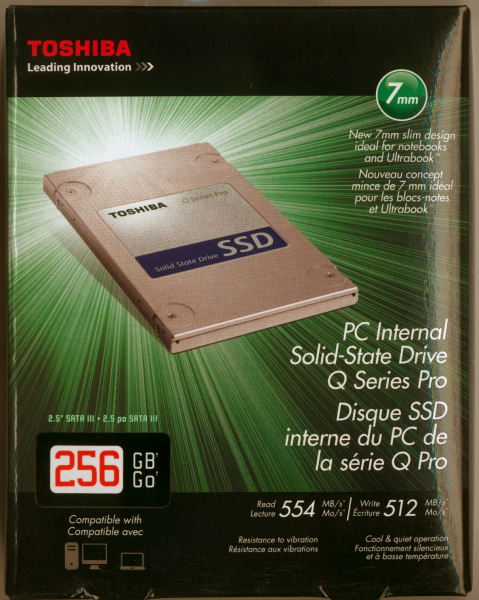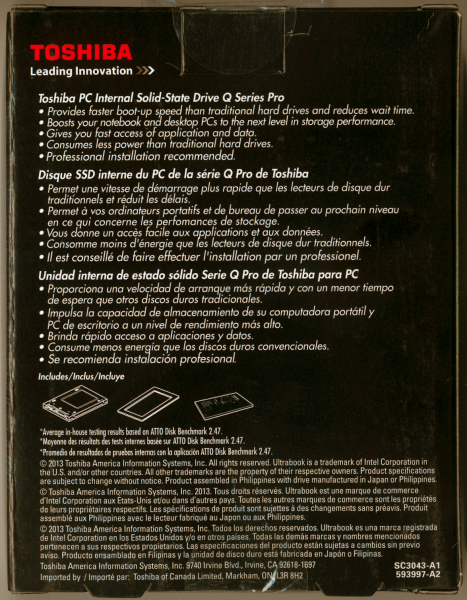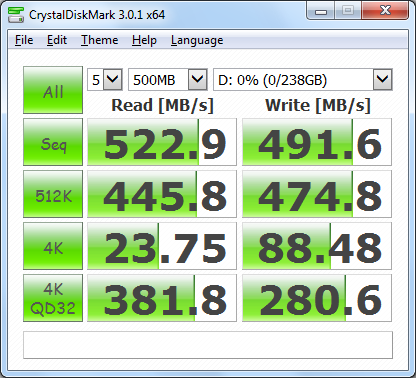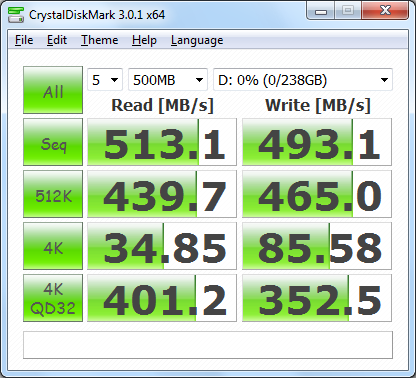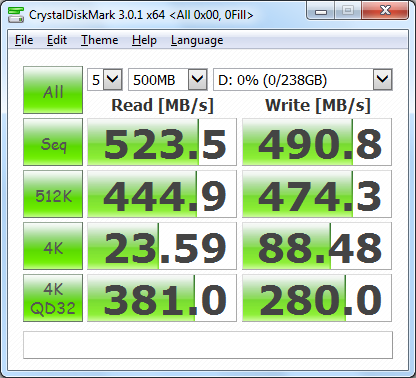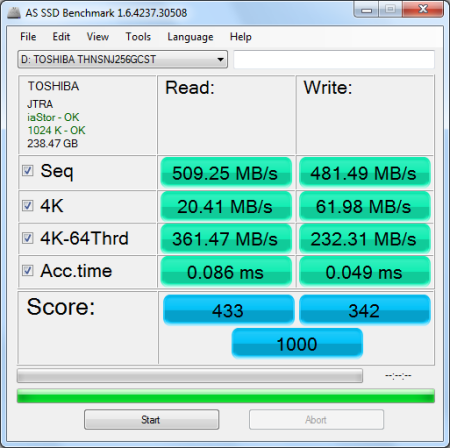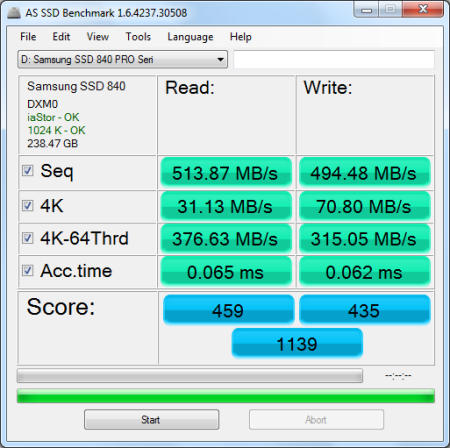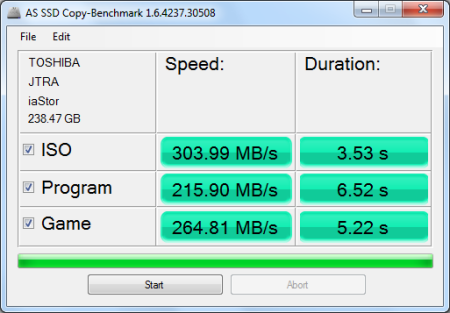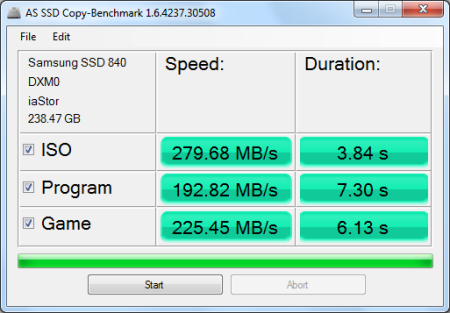

Model: Toshiba Q Series Pro 256GB Solid State Drive
Manufacturer: Toshiba
Provided By: Reader Donations
Toshiba has been a leader in the consumer electronics industry for as long as I can remember. Founded more than 70 years ago, this Japanese company manufacturers everything from tiny electronic components to consumer products like televisions, Blu-ray players and personal computers. Toshiba is no stranger to the storage industry either. The company designs and manufactures high-quality flash memory-based storage solutions, SSDs and hard disk drives for the consumer and enterprise markets.
This past fall, Toshiba launched its Q Series Pro SSD. Available in capacities ranging from 128GB up to 512GB, this ultra-slim drive is ideal for avid gamers, graphics professionals or anyone else looking to boost their computer's storage performance to the next level. With no moving or mechanical parts, the Q Series Pro is more rugged, quieter and consumes less power than standard hard drives. Also, with Toshiba's TC358790XBG controller and 19nm Toggle mode MLC NAND flash, the drive is able to deliver faster boot up speeds, shorter application load times and improved system responsiveness.
For this review, we purchased the 256GB version of the Q Series Pro. This drive is capable of delivering up to 554MB/s sequential read and 512MB/s sequential write speeds as well as up to 90,000 random read and 35,000 random write IOPS.
| Toshiba Q Series Pro 256GB Solid State Drive | |||||||||||||||||||||||||||||
General Specifications
Performance
Reliability
Environmental
Dimensions and Weight
Other Features
|
Needless to say, this is only a taste of what the Q Series Pro has to offer. To give you an idea of what to expect, we'll take a closer look at Toshiba's new SSD and then see how well it performs. Does the Q Series Pro have what it takes? Is it the best bang for your buck? Keep reading as we find out.
The Q Series Pro comes in a small, black box. Along with a picture of the drive, the front advertises many of its key features including its 256GB capacity, maximum read and write speeds and 7mm form factor. The back of the box provides a bit more information as well as some images of the box's contents. Inside, you'll find the SSD, a mounting spacer for use with traditional 9.5mm drive bays, a quick install guide and some warranty information. While not included in the box, a free copy of NTI Echo can also be downloaded from Toshiba's website.
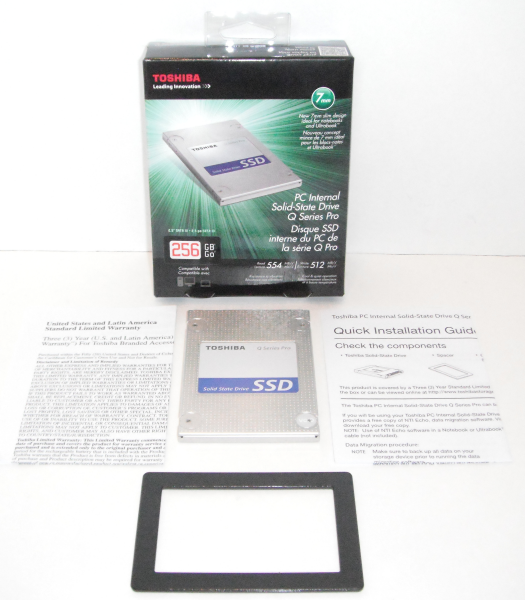
Physical Features:
The construction of the Q Series Pro is very similar to Toshiba's other 2.5" SSDs. The outer casing is made entirely out of a lightweight, metal alloy. Also, instead of a matte finish, the Q Series Pro sports a more natural look which is broken up by a series of of small dots.
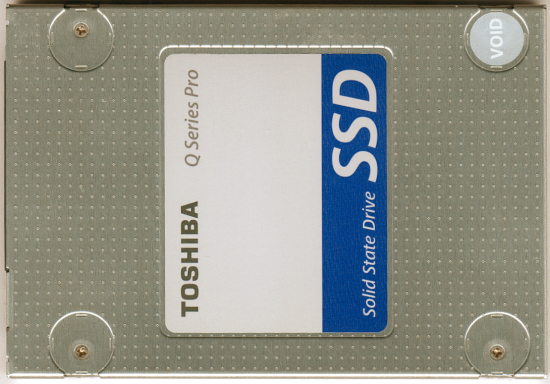
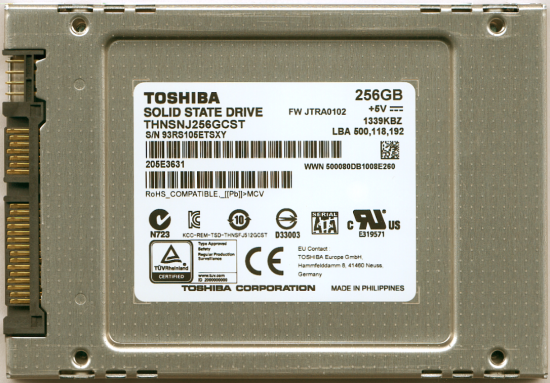
As I mentioned earlier, the Q Series Pro uses Toshiba's TC358790XBG controller chip. Its been suggested that, like the controller in the Q Series, the TC358790XBG is based on a Marvell design. The chip's dimensions do support this theory but Toshiba representatives have stated that it was designed in house and was not sourced from Marvell.
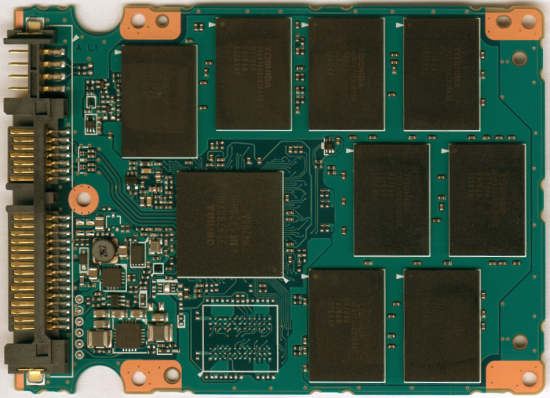

For the 256GB version of the Q Series Pro, Toshiba opted to use their own 32GB 19nm TH58TEG8CDJBASC Toggle Mode NAND flash chips. Looking at the picture above, you can see that there are eight of these chips on the top of the PCB. Despite there being a place on the PCB for a DRAM cache chip, the Q Series Pro does not have one. While it's possible that Toshiba decided to go without a DRAM cache, the more likely story is that instead of a separate chip, it has been included as part of the controller.
The test system used in this review was an HP 8200 Elite. The computer came equipped with an Intel Core i5-2400 CPU, 4GB of DDR3 1333MHz memory, Seagate Barracuda 7200.12 ST3250312AS 250GB SATA 6 Gb/s hard drive, NVIDIA Quadro FX580 512MB PCIe graphics card and an Intel 82579-LM gigabit network card. For the operating system, I installed a fresh copy of Windows 7 Enterprise.
To test the performance of the Toshiba Q Series Pro, I ran a series of benchmarks using CrystalDiskMark 3.0.1, HD Tach RW 3.0.4.0, ATTO Disk Benchmark 2.46, AS SSD, HD Tune Pro 4.61, Anvil's Storage Utilities and Iometer. For comparison, I've also included test results from the Plextor PX-256M6M, Samsung SSD 840 EVO mSATA, OCZ Vector 150, OCZ Vertex 450, Silicon Power Slim S55, Samsung SSD 840 EVO, Seagate 600 SSD, SanDisk Extreme II, Plextor PX-256M5M, OCZ Vector, Plextor PX-256M5Pro Xtreme, Samsung SSD 840 Pro, Samsung SSD 840, Kingston Ultra Plus, OCZ Vertex 4, OCZ Agility 4 and Kingston HyperX 3K.
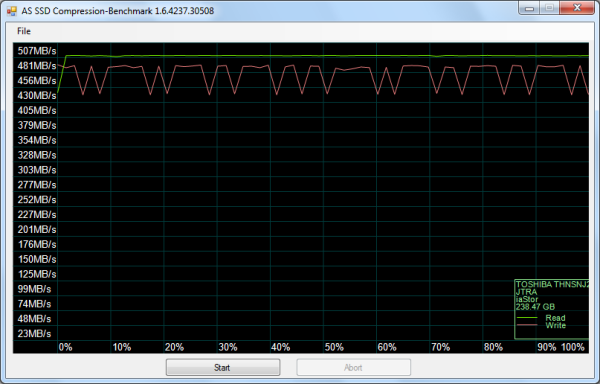
As I mentioned earlier, the Q Series Pro is based on Toshiba's TC358790XBG controller chip. Looking at the screenshot above, you can see that it performs equally well with both incompressible (0%) and compressible (100%) data.
CrystalDiskMark 3.0.1:
First, I ran a few quick tests using CrystalDiskMark. This benchmark tool measures the performance of a storage device by testing its sequential read and write speeds as well as its random read and write speeds using blocks 512K and 4K in size.
According to Toshiba, the 256GB Q Series Pro is capable of reading at 554 MB/s and writing at 512 MB/s when connected to a SATA 6 Gb/s port. While the drive performed well, it came up a bit short of these numbers in CrystalDiskMark's sequential read and write speed tests.
The Q Series Pro performed equally well when using highly compressible 0x00 (0 Fill) data. This time around, the drive was able to read at 523.5 MB/s and write at 490.8 MB/s.
HD Tach RW 3.0.4.0:
Next, I used HD Tach to test the Q Series Pro's read, write and burst speeds as well as its seek times and CPU usage.

Looking at the screenshot above, you can see that the Q Series Pro had average read and write speeds of 408.5.5 MB/s and 256.8 MB/s respectively, as well as a burst speed of 325.0 MB/s.
ATTO Disk Benchmark 2.46:
I also used ATTO Disk Benchmark to test the Q Series Pro's sequential read and write speeds. The tests are run using blocks ranging in size from 0.5KB to 8192KB and the total length set to 256MB.
When tested with ATTO, the Q Series Pro's read speeds topped out at about 554 MB/s and its write speeds at 521 MB/s.
AS SSD:
AS SSD is a relatively new benchmark designed specifically for solid state drives. The application contains five synthetic tests used to determine the sequential and random read and write performance of a drive.
AS SSD also includes a copy benchmark. This test copies an ISO (two large files), program (many small files) and game (small and large files), returning the speed and duration of each.
HD Tune Pro 4.61:
Next, I ran a series of tests using HD Tune Pro. This hard disk utility measures a drive's performance by testing its sequential read and write speeds as well as its access time, burst rate and CPU usage. For this review, I'm also going to use it to benchmark the Q Series Pro's random read and write speeds, random access times and the number of operations per second.
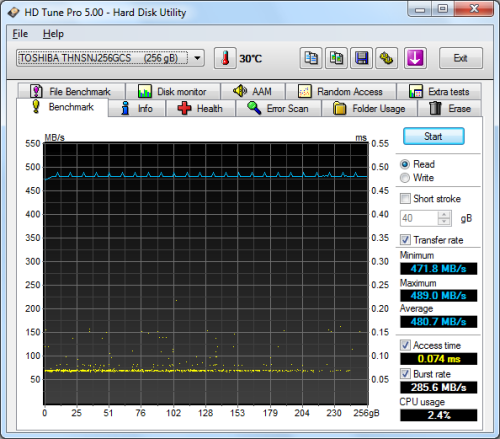 Toshiba Q Series Pro 256GB - HD Tune Read Benchmark |
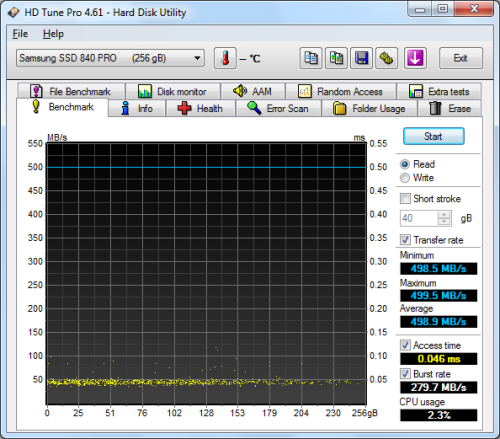 Samsung SSD 840 Pro 256GB - HD Tune Read Benchmark |
 Toshiba Q Series Pro 256GB - HD Tune Write Benchmark |
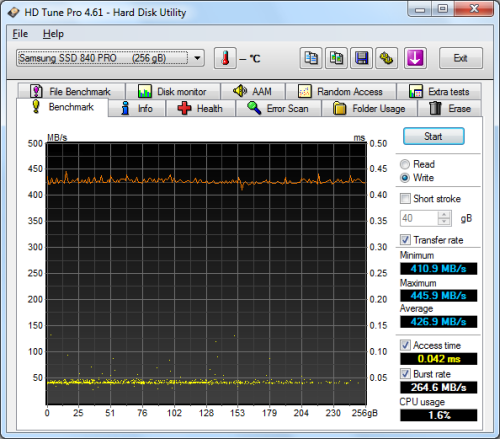 Samsung SSD 840 Pro 256GB - HD Tune Write Benchmark |
The Q Series Pro performed relatively well when benchmarked with HD Tune. The drive had average read and write speeds of 480.7 MB/s and 464.5 MB/s, respectively, and a burst rate of 285.6 MB/s when reading
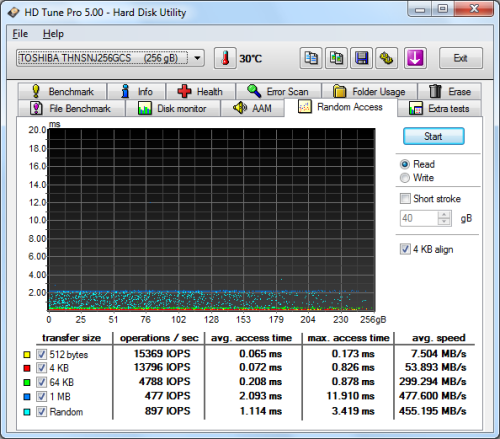 Toshiba Q Series Pro 256GB - HD Tune Random Access Read |
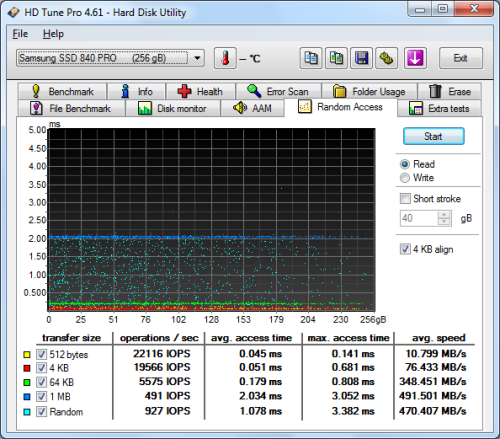 Samsung SSD 840 Pro 256GB - HD Tune Random Access Read |
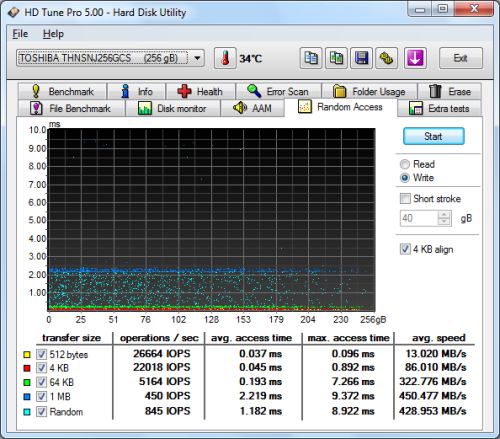 Toshiba Q Series Pro 256GB - HD Tune Random Access Write |
 Samsung SSD 840 Pro 256GB - HD Tune Random Access Write |
The Q Series Pro didn't disappoint when doing random reads and writes. When reading 4KB blocks, the drive reached 13,796 IOPS and had an average speed of 53.893 MB/s. The Q Series Pro was even faster when writing, reaching 22,018 IOPS with an average speed of 86.010 MB/s.
Anvil's Storage Utilities:
Anvil's Storage Utilities is another new benchmark designed with SSDs in mind. The standard storage benchmark measures a drive's performance by testing its transfer speeds, access times and IOPS.
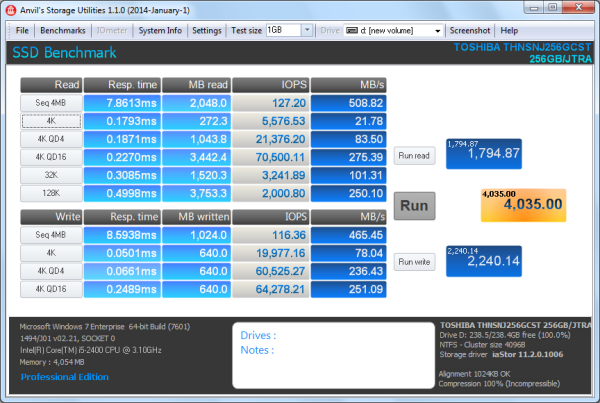
Iometer:
Lastly, I ran a series of tests using Iometer. This tool can be configured to benchmark a number of things. In this case, I used it to measure the Q Series Pro's read and write speeds and the number of operations per second. The tests were run using random bytes and a queue depth of 3.
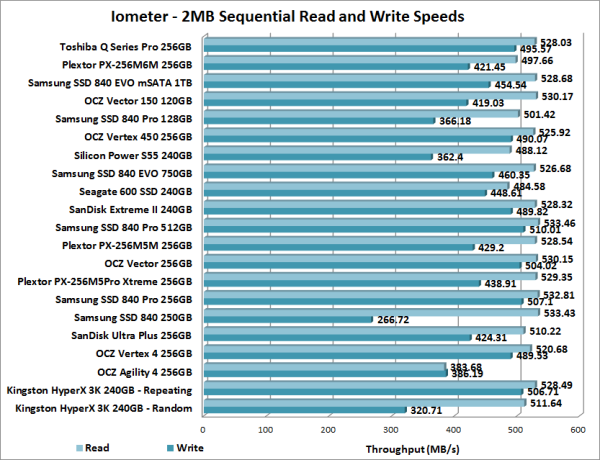
The Q Series Pro's performance was very similar to what we saw in our other tests. The drive was able to read at 528.03 MB/s and write at 495.57 MB/s.

The Q Series Pro wasn't one of the faster drives we've tested when it came to random reads and writes. In our tests, the drive was able to read at 111.47 MB/s and write at 225.09 MB/s.
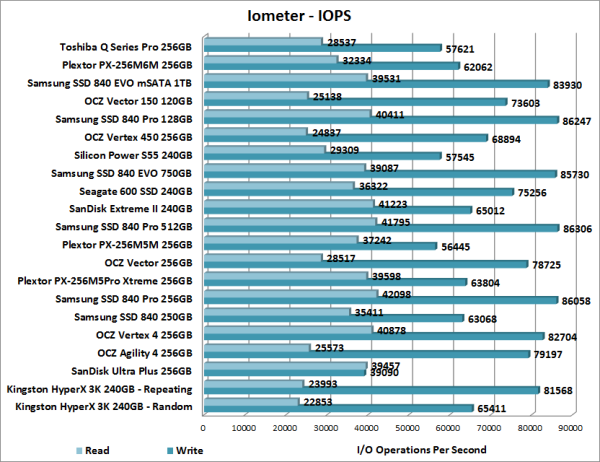
According to Toshiba, the Q Series Pro is capable of 90,000 IOPS when reading and 35,000 IOPS when writing 4K blocks. In our tests, the drive reached 28,537 random read IOPS and 57,621 random write IOPS. Increasing the queue depth had little impact on the Q Series Pro's random write performance. However, with the queue depth set to 32, the drive was able to reach 94,141 random read IOPS.
TRIM Performance:
While SSD's offer many benefits, there are some downsides to using flash memory. One of the biggest issues people run into is performance degradation. Over time, an SSD will run out of fresh blocks and will have to write over data the file system has marked as deleted. This procedure is very complicated and can slow an SSD's write speeds considerably.
To fix this problem, most manufacturers have added TRIM support to their SSDs. The TRIM command allows an operating system, such as Windows 7, to tell an SSD which data blocks are no longer in use. Using this information, the drive pro-actively erases these blocks and adds them to the free block pool.

To test the Q Series Pro's TRIM function, I first put the drive in a "dirty" state. I used Iometer to fill the entire drive and then ran a random write test for 30 minutes. Looking at the screenshot below, you can see that the Q Series Pro's average read and write speeds dropped to 283.8 MB/s and 77.8 MB/s, respectively.
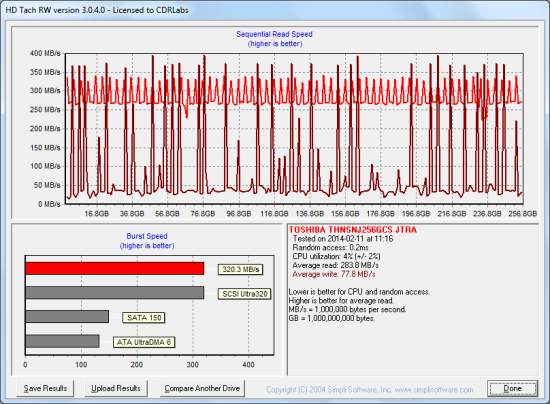
Toshiba Q Series Pro 256GB - Dirty
To see how well the Q Series Pro could recover, I let the computer sit for about two and a half hours and then reran the test. The drive wasn't able to reach the factory fresh performance shown in our earlier tests. However, its average write speed climbed up to 182.0 MB/s.
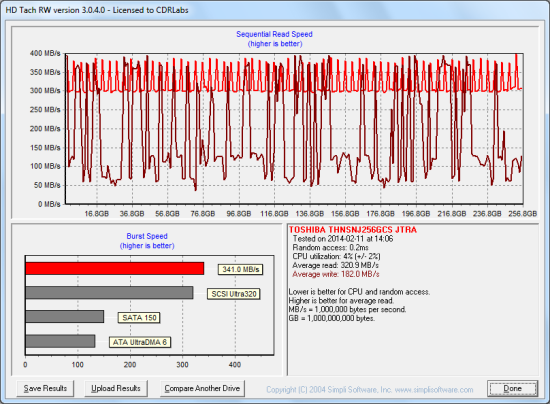
Toshiba Q Series Pro 256GB - After TRIM
Lastly, I used Parted Magic to perform a secure erase on the Q Series Pro. With the drive wiped clean, it had average read and write speeds of 343.5 MB/s and 377.6 MB/s, respectively.
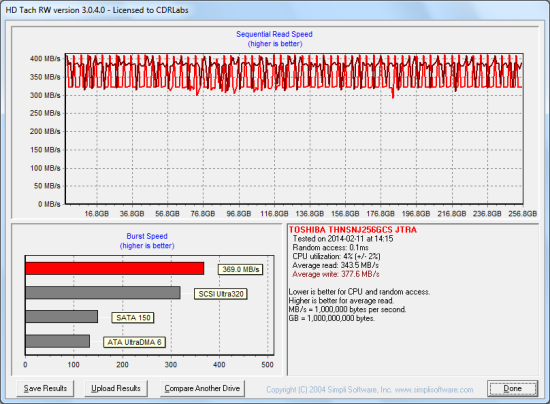
Toshiba Q Series Pro 256GB - Secure Erase
Final Thoughts:
While not the fastest or most feature packed SSD to come through the 'Labs, Toshiba's Q Series Pro delivers a lot of bang for your buck. This ultra-slim drive combines Toshiba's TC358790XBG controller with their own 19nm Toggle mode MLC NAND flash to deliver a fast and responsive computing experience. In our sequential read and write tests, the Q Series Pro was able to read at speeds as high as 554 MB/s and write at speeds in excess of 490 MB/s. Despite the lack of a separate DRAM cache, it also did better than expected in our random write tests, producing more than 57,000 IOPS at low queue depths. Given, these numbers aren't nearly as high as what we saw with Samsung's 840 EVO series SSDs. However, the Q Series Pro is still a huge step up over traditional hard drives and an ideal for those on a budget, looking to upgrade an older desktop or notebook computer.
Toshiba's Q Series Pro SSD is available now in 128GB, 256GB and 512GB capacities. Prices on Amazon.com currently range from $87 up to $355, with the 256GB version reviewed here going for about $154.

Highs:
- Available in 128GB, 256GB and 512GB capacities
- Excellent sequential read and write speeds
- Performs equally well with compressible and incompressible data
- SATA 6Gb/s interface
- Toggle Mode NAND flash
- Supports SMART and TRIM
- Ultra-slim form factor
- Includes NTI Echo data migration software
- Includes mounting spacer for 9.5mm applications
- Reasonably priced
- 3 year warranty
Lows:
- Mediocre random read and write performance
- Does not support hardware based encryption
